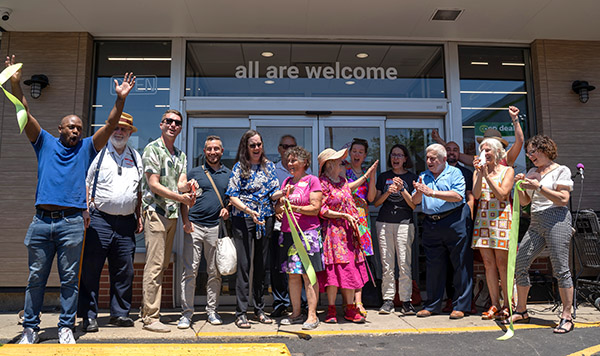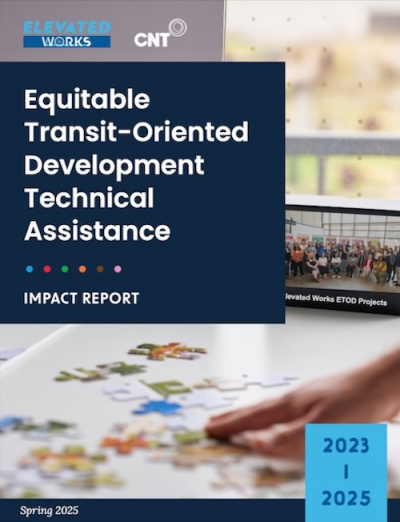CNT is excited to release our Urban Opportunity Agenda today. This new framework for economic development turns the traditional job creation model on its head, generating economic growth from the ground up by systemically reducing the cost of living and doing business in a place.
In communities across the country, high poverty rates, stagnant wages, and the rising cost of living are dragging down local economies. In contrast, new efficiencies and targeted investments can provide a win-win, boosting economic growth while putting more money in the pockets of working families. The Urban Opportunity Agenda gives civic leaders the tools to choose investments that reduce poverty, create economic opportunity, and build stronger cities.
With support from Knight Foundation, CNT evaluated 10 communities and found that the number of people living in poverty could be reduced by 25 percent or more though a combination of expense reductions for families, targeted job creation, and smarter public and private investments. For each of the 10 communities, CNT has compiled data on the economic costs of poverty and identified a portfolio of concrete poverty reduction strategies.
The 10 Urban Opportunity Agenda communities include Akron/Summit County, OH; Charlotte, NC; Detroit, MI; Gary, IN; Long Beach, CA; Macon-Bibb County, GA; Miami-Dade County, FL; Philadelphia, PA; San Jose, CA; and St. Paul, MN.
Economic growth is not enough to reduce poverty
Regions across the country are recovering from the economic downturn, but not all households benefitting from that recovery. In all 10 places we studied the poverty rate has risen. CNT’s research shows that when civic leaders invest to reduce inefficiency, lower expenses for families, and create connected communities, multiple benefits follow:
- Reduced spending on transportation, energy and water by all households and businesses
- Environmental and economic resiliency
- Improved access to basic services, jobs, and education for everyone
In the coming weeks, CNT will be holding meetings and conversations with elected officials, community organizations, and business leaders in 10 Urban Opportunity Agenda communities. To host a conversation or find out more about scheduled events, please contact me at jen@cnt.org or 415.644.0877.
This work builds on decades of research, policy, tools, and implementation by CNT to create and document the benefits of sustainable and equitable communities. Here’s what people are saying about the Urban Opportunity Agenda:
“Our current economic development strategies are not enough to significantly reduce poverty. We need to shift how we go about creating economic opportunity. The Urban Opportunity Agenda gives communities a blueprint for how to use public resources more efficiently and make a real difference for families of all incomes.” Bruce Katz, Centennial Scholar, Brookings Institution.
“Any public official knows that money doesn’t grow on trees. The Urban Opportunity Agenda provides cities with a guide to making smarter investments, allowing us to produce the highest return on those investments to the benefit of businesses, working families, and the local economy.” Joel Rogers, Director of COWS and Mayors Innovation Project.
“Gary, like many cities around the country, has had to do more with less as public resources have become even more limited. The Urban Opportunity Agenda gives us detailed roadmap for how we can reduce the cost of living for working families while growing our economy in a way that benefits everyone. It’s a win-win.” Bo Kemp, Director Gary Economic Development Corporation.
“After decades of suffering from shrinking populations, cities are growing again. But that growth is juxtaposed against chronic poverty. Three-quarters of high-poverty urban neighborhoods that were around in 1970 are still poor today. The Urban Opportunity Agenda can help cities identify investments that can address community challenges and also support growth.” Benjamin de la Peña, Director for community and national strategy at the John S. and James L. Knight Foundation.
“More than any sports arena, industrial park, or business subsidy, poverty reduction has the potential to be an economic engine for cities. By making targeted investments that help families spend less on the basics, we can create widespread economic value.” Scott Bernstein, President Center for Neighborhood Technology.
A complete summary of the Urban Opportunity Agenda, including reports and data analysis for each of the 10 communities, is available here.





 Strengthening Transit Through Community Partnerships
Strengthening Transit Through Community Partnerships